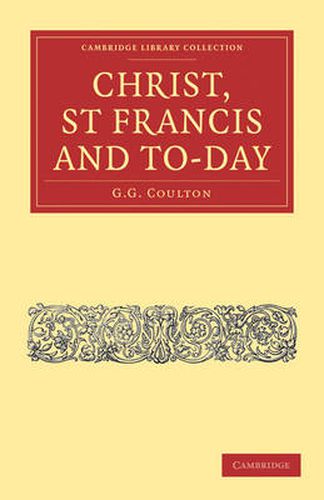Readings Newsletter
Become a Readings Member to make your shopping experience even easier.
Sign in or sign up for free!
You’re not far away from qualifying for FREE standard shipping within Australia
You’ve qualified for FREE standard shipping within Australia
The cart is loading…






Medieval historian G. G. Coulton relinquished his own holy orders in 1885 but remained firmly engaged with Christianity. This 1919 collection of lectures is a radical and impassioned discussion of how Christianity must change to meet the needs of post-war society as soldiers return from the trenches. Drawing parallels between the lives of Jesus Christ and St Francis of Assisi, Coulton highlights how ambiguities in the surviving accounts of both men have diverted the original course of their ministry and, with it, the objectives and outlook of the church. The author also takes on the weaknesses in both Catholic and agnostic arguments and advocates a simplifying and democratisation of Christianity and the resolving of denominational differences. Included alongside the lectures is the author’s comprehensive response to a number of questions raised by the original lecture series which provides a useful conclusion to the controversial anti-Catholic’s plea for religious modernisation.
$9.00 standard shipping within Australia
FREE standard shipping within Australia for orders over $100.00
Express & International shipping calculated at checkout
Medieval historian G. G. Coulton relinquished his own holy orders in 1885 but remained firmly engaged with Christianity. This 1919 collection of lectures is a radical and impassioned discussion of how Christianity must change to meet the needs of post-war society as soldiers return from the trenches. Drawing parallels between the lives of Jesus Christ and St Francis of Assisi, Coulton highlights how ambiguities in the surviving accounts of both men have diverted the original course of their ministry and, with it, the objectives and outlook of the church. The author also takes on the weaknesses in both Catholic and agnostic arguments and advocates a simplifying and democratisation of Christianity and the resolving of denominational differences. Included alongside the lectures is the author’s comprehensive response to a number of questions raised by the original lecture series which provides a useful conclusion to the controversial anti-Catholic’s plea for religious modernisation.